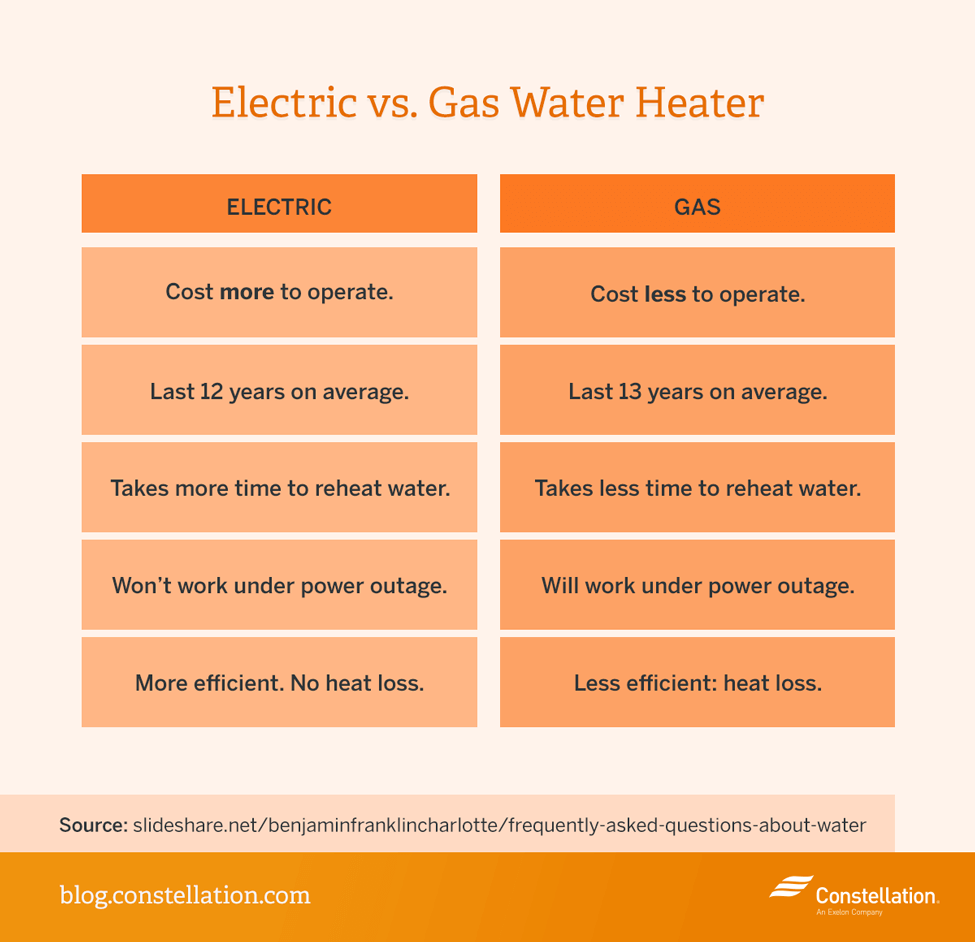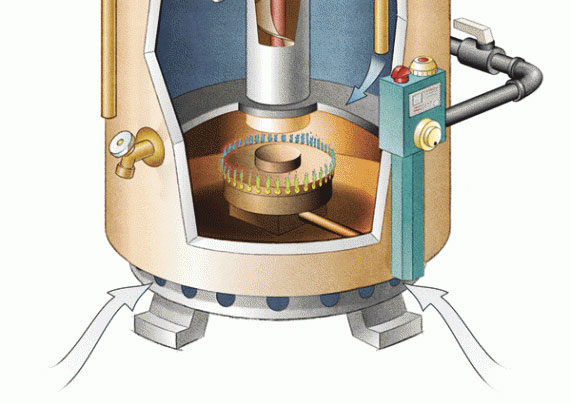A water heater using too much gas can indicate inefficiency or malfunction. Regular maintenance and timely inspections are crucial.
Water heaters are essential for daily comfort, but excessive gas usage can lead to high energy bills. Identifying the cause of high gas consumption is important for both cost-saving and safety. Common issues include sediment buildup, faulty thermostats, or aging units.
Regular maintenance, such as flushing the tank and checking for leaks, can improve efficiency. Upgrading to a modern, energy-efficient model might be a wise investment. By addressing these issues promptly, homeowners can ensure their water heaters operate efficiently, reducing gas consumption and saving money. Proper care and timely repairs can prolong the life of the unit and enhance overall performance.
Page Contents
- 1 The High Cost Of Hot Water
- 2 Types Of Gas Water Heaters
- 3 Signs Your Water Heater Is Inefficient
- 4 Regular Maintenance For Efficiency
- 5 Upgrading Your Water Heater
- 6 Smart Habits To Reduce Hot Water Use
- 7 Insulation And Heat Loss Prevention
- 8 Technological Advances And Alternatives
- 9 Financial Incentives And Rebates
- 10 Diy Vs. Professional Help
- 11 Frequently Asked Questions
- 12 Conclusion
The High Cost Of Hot Water
Older water heaters use more gas. Heating water for long periods increases gas use. Showers and baths use lots of hot water. Leaky pipes waste hot water and gas. Poor insulation makes heaters work harder.
Winter months need more hot water. Cold weather makes heaters work harder. Summer uses less gas for hot water. Seasonal changes affect gas bills a lot. Comparing usage helps understand high gas bills.
Types Of Gas Water Heaters
Gas water heaters come in various types like tankless, storage tank, and condensing models. High gas consumption often points to issues like sediment buildup, faulty thermostats, or improper insulation. Regular maintenance can help improve efficiency and reduce gas usage.
Traditional Tank Water Heaters
Traditional tank water heaters have a large storage tank. This tank holds heated water. They keep water hot all day. This uses a lot of gas. They are easy to install. These heaters are less expensive upfront. Traditional tank water heaters can run out of hot water. This happens if many people use hot water. They need regular maintenance. This includes flushing the tank. This removes sediment buildup. Sediment buildup can reduce efficiency. It can also cause damage over time.
Tankless On-demand Water Heaters
Tankless on-demand water heaters heat water only when needed. They do not have a storage tank. This saves gas. These heaters are more efficient. Tankless heaters provide endless hot water. They take up less space. Installation can be more complicated. They are more expensive upfront. Maintenance is also important. Regular maintenance ensures efficiency. It also extends the heater’s life. They are a good choice for energy savings.
Signs Your Water Heater Is Inefficient
A sudden rise in gas bills can mean trouble. Your water heater might be using more gas. This can happen if the heater is old or broken. Keeping track of your bills can help spot this issue. Fixing it early can save money and energy.
Waiting too long for hot water is a bad sign. Your heater should work quickly. If not, it might be wasting gas. A slow heater can be frustrating and costly. Regular checks can help keep your heater in shape. It ensures you get hot water fast.

Credit: blog.constellation.com
Regular Maintenance For Efficiency
Gas water heaters need annual inspections. A professional can check for leaks and corrosion. Regular servicing ensures the heater runs efficiently. This can help you save on gas bills. Technicians will also check the burner and pilot light. Clean parts work better and use less gas.
Sediment can build up in your water heater. This reduces efficiency and increases gas use. Flushing out the sediment helps the heater work better. It should be done at least once a year. Doing this can extend the life of your heater. Sediment removal is an easy task but very important.
Upgrading Your Water Heater
Modern energy-efficient water heaters save money on gas bills. They are designed to use less energy than older models. This means more hot water with less gas consumption. These models often come with smart features that help in monitoring usage. This leads to better efficiency and lower costs. Another benefit is their environmentally friendly nature. By using less gas, they reduce carbon footprint.
Consider a replacement if your current water heater is over 10 years old. Frequent repairs are another sign. High gas bills can indicate inefficiency. Rusty water from taps suggests an issue. Strange noises from the heater are also a warning. Newer models offer better performance and cost savings.
Smart Habits To Reduce Hot Water Use
Take shorter showers to save hot water. Use a timer to help. Install low-flow fixtures. These reduce water usage. Less water used means less gas needed. This helps save money and the environment.
Wash clothes in cold water. Cold water cleans clothes just as well. This saves hot water. Using hot water for laundry uses more gas. Cold water detergents work best. This simple change can make a big difference.
Insulation And Heat Loss Prevention
Wrapping your water heater tank helps save gas. Use a special blanket for this. The blanket keeps the heat inside. This means the heater uses less gas. Make sure the blanket fits well. Leave the top open if needed. Check the heater’s manual for guidance.
Insulating hot water pipes also saves gas. Use foam pipe insulation for this. Cut the foam to fit the pipes. Wrap the foam around each pipe. Secure the foam with tape or clips. This keeps the water hot longer. The heater uses less gas to keep the water warm.
Technological Advances And Alternatives
Solar water heating systems use the sun’s energy. These systems are eco-friendly. Solar heaters reduce gas consumption. Panels absorb sunlight and convert it into heat. The heat warms up the water in the tank. Solar water heaters work well in sunny areas. They are a good long-term investment. They help save on energy bills.
Heat pump water heaters use electricity. They are more energy-efficient than gas heaters. These heaters transfer heat from the air to the water. Less gas means lower bills. They work best in warm climates. Heat pumps are a sustainable choice. They help reduce your carbon footprint. Installation may cost more initially, but savings will follow.
Financial Incentives And Rebates
Many governments offer rebates for energy-efficient water heaters. These rebates help you save money. Energy-efficient models use less gas. This reduces your gas bill. Check your local government website. Find the available rebates. Apply for these rebates online. Save money and energy.
Utility companies often have incentive programs. These programs encourage you to use less gas. They may offer discounts on energy-efficient appliances. Some even provide free installation. Contact your utility company. Ask about their incentive programs. Take advantage of these offers. Save money and reduce gas usage.

Credit: www.greenbuildingadvisor.com
Diy Vs. Professional Help
Check the thermostat setting. It should be at 120 degrees Fahrenheit. Clean the burner if it looks dirty. This can improve efficiency. Inspect the pilot light. It should be blue. A yellow flame means trouble. Make sure the vent is clear. Blocked vents can waste gas. Flush the tank to remove sediment buildup. This can improve performance.
If the water heater is leaking, call a professional. Strange noises can signal big problems. Gas smells are a serious issue. Turn off the gas and call for help. If the pilot light keeps going out, you need expert advice. Complex repairs should be left to professionals. They have the right tools and skills. Safety should always come first.

Credit: www.reddit.com
Frequently Asked Questions
Why Is My Heater Using So Much Gas?
Your heater may use excessive gas due to poor insulation, clogged filters, or an outdated system. Regular maintenance helps.
Why Is My Water Heater Usage So High?
High water heater usage can result from a faulty thermostat, sediment buildup, or insufficient insulation. Check for leaks and consider upgrading to an energy-efficient model. Regular maintenance can also help reduce energy consumption.
Why Is My Natural Gas Water Heater Running Constantly?
A constantly running natural gas water heater may indicate a faulty thermostat, sediment buildup, or a malfunctioning heating element. Check for leaks and insulation issues.
Does An Old Water Heater Use More Gas?
Yes, an old water heater often uses more gas. Aging components and sediment buildup reduce efficiency, increasing gas consumption.
Conclusion
Taking steps to ensure your water heater uses gas efficiently can save money and energy. Regular maintenance and timely repairs are crucial. Implementing these tips will help you manage your gas consumption better. Always consult a professional for persistent issues.
Stay proactive to enjoy a warm and efficient home.
